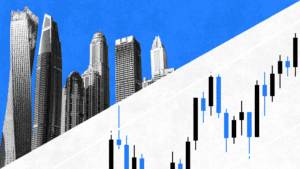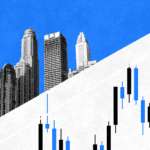“Oh no, the market is crashing! Sell everything and get your money out ASAP!“
We bet you’ve been hearing this everywhere you go lately! Truth be told, that’s how novice investors would be thinking right now. Due to an overwhelming volume of information pumped out across news outlets and social media platforms, we are currently seeing a bloodbath across all markets, reminiscent of the covid crash back in 2020, with investors panic-selling their valuable assets.
Unfortunately, that’s not the right mindset for becoming a smart investor.

Firstly, ‘the market’s down’ is a very broad and misleading statement. Markets go up and down, as seen in the wake of the coronavirus outbreak. However, the worst thing you can do during a “market crash” is to panic and make irrational decisions that could lock in losses.
The main reason why the term “market crash” is dominating headlines lately is essentially due to the recent US stock market downturn. So, what has caused this plunge? Why is panic spreading throughout the entire financial market?
Speaking of which, since when are all markets equally affected by a dip?! Stocks aren’t meant to all simultaneously move up or down, because various factors drive the market each day. In this case, soaring inflation and interest rates are throwing investors on edge, but several commodities have actually remained stable, namely oil, gold, and silver.
This proves that the US stock market or tech companies shouldn’t be your only investment choices. Whether we like it or not, market crashes are bound to happen.
But what some are failing to understand is that the market and its inherent volatility won’t necessarily cause issues in the long run. If anything, panic-selling at the slightest hint of a market crash will. Generally, investing should be a long-term play. Whether you want to invest for retirement or grow your savings, building a diversified portfolio is key for weathering any market crash storm.
Market Crash or Correction?
While many financial experts are deliberately defining this notion as a “market crash”, in reality, it’s more of a market correction. The market has been way over-valued since the covid dip, so a correction is merely a natural and integral part of the market cycle. Could history repeat itself? Will the market bounce or continue to drop? Truthfully, no one knows for sure. There are many variables that only become clearer in hindsight but not in real-time.
It’s important to note, however, that in the past, every crash or correction has been followed by markets reaching all-time highs. Meaning, you shouldn’t panic and sell too soon. This is why we say “time in the market is better than timing the market”. So, if you decide to move forward during a correction, you can avoid decisions that completely wipe out your portfolio’s value. That’s why it’s essential to resist your emotions and stick to your plan firmly.

Planning Ahead
For your own peace of mind, set aside a rainy day fund, which is simply cash, or any other form of highly liquid assets, so you’re not forced to sell your investments in the event of a correction or in worst cases, a market crash. This should be able to cover a minimum of 6 months’ worth of your current living costs, including rent, food, entertainment, and any other expenses.
This not only helps you sleep better at night during a downturn, but more importantly, it allows you to at least plan exits for your investments, as opposed to suddenly selling your investments, for example, in an environment where the market is down double digits. Point is, if you’ve invested for the long-term and have a rainy-day fund saved, then you wouldn’t be desperate to exit.
Think Long-term
Speaking of the long-term, sometimes investors get so caught up in the moment that they ignore the bigger picture. Yes, volatility is scary, but acting out of fear causes erroneous investment decisions. This is what the 1% don’t tell you. They almost never sell their assets. Who cares if the market collapses if your investments have been compounding more than that over time? Does it matter if the market crashes tomorrow when you need the money in, say, 20 years? Remember your plan and don’t just abandon ship!
Not only that, you should never invest more money in the market than you can afford to lose. If you’re not willing to invest for the long haul and can’t hold a stock for years to come, you shouldn’t really be investing. It should never be a life or death situation if the market has a bad year or two. As long as you remind yourself that recovery is probable, don’t sell at the bottom.

Make Your Money Work For You
In fact, if you have some liquidity, you should look for opportunities to put your capital to work. You’d obviously need to do your homework and buy quality assets that make sense in the business cycle that we’re in, and not necessarily what made money the last quarter.
It’s best to not go all-in with your capital, so inject gradual amounts to give you better entry points in case there are further complications in the market. Investing and creating wealth is not easy, and certainly doesn’t happen overnight. But if you look at history, people actually became wealthy when they took advantage of market crashes. Think of how many people became millionaires by investing and modifying their portfolio risk in 2008 or 2020, while everyone else was busy panic-selling.
I mean, Warren Buffet summarized this notion succinctly when he said: “Be greedy when others are fearful and be fearful when others are greedy.”
Fear clouds your judgment, so the worst thing you can do is make a poor decision based on your emotions. In a climate where people are vacillating between greed and fear, be greedy!
Manage Your Risk
It all comes down to managing your risk. Another way of looking at risk is knowing how volatile a particular investment is. For example, something like Bitcoin can move up and down between 10-15% in a day, and this was seen directly after the US Federal Reserve signaled that the central bank was likely to raise interest rates to tackle high inflation.
Stock markets typically move 1-3%, whereas investments in bonds and real estate fluctuate even less. Out of the mentioned markets, Bitcoin is the most volatile and therefore the riskiest. So, depending on your risk profile you would typically have less allocation to cryptocurrency than stocks, because of the former’s volatility.
Now, this doesn’t mean that you shouldn’t invest in any of those markets. You most certainly can, but it’s better for you to build your portfolio based on your risk tolerance and allocate capital accordingly. In fact, despite the unregulated risk involved, many find that investing in cryptocurrency is very much worth the reward, with seasoned investors buying the dip.
Another concept you should be aware of when it comes to risk management is profit-taking. After all, no one ever went broke by taking profits when assets had risen in price! Now, this doesn’t mean you should sell all your stocks and cash out to hedge against any potential losses, as many investors tend to miss out when they sell too early. Instead, taking profits by selling some shares at a high to lock in your gains, is a good risk management strategy. Otherwise, if the market drops by 10-15% the next day, then you could potentially wipe out all your gains by taking that chance to hold all your assets.
The Bottom Line
Moral of the story is do not panic, because the market is just going through another one of its cycles – a correction. The easiest way to get through such times is to be patient and stick with your investment plan, rather than trying to adapt to a volatile market with your emotions running wild. For instance, all the investors who took advantage of the distressed real estate prices before and during covid are happy as Larry today.
At present, investors want options. Residential real estate is one of the easiest and safest ways for investors to diversify their investment portfolios and minimize risk. One way this can be done is by dividing capital across multiple property shares through crowdfunding platforms.
The fact is, the real estate market hasn’t dipped despite the inflation surge and is traditionally considered a great hedge, so it remains an attractive investment option. Real estate is simply not as volatile, and the factor of the matter is: people will always need a home!
For even more security, you could save cash in a rainy day fund, or invest in tangible assets like gold. Point is, invest for the long-term and always keep your powder dry, so you can take advantage of discounts – just like you would at the Dubai Shopping Festival. 😉






